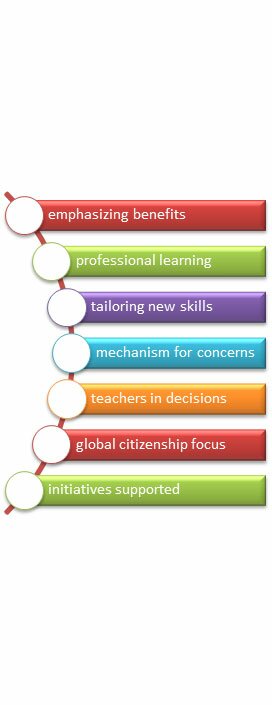
School leaders are in a key position to create systems and processes that increase resilience and facilitate successful integration into Canadian society. Recent literature and research has begun to identify what model schools do when working with students with refugee populations. This includes creating an environment for understanding, acceptance and integration of these students, forging connections with families, supporting teachers’ professional learning, developing an enhanced learning support team to meet individual needs, and utilizing expanded community connections to foster enhanced services. Model schools demonstrate the following practices.
- Developing knowledge of refugee population and their experiences
- Assessing needs of refugee population within a district
- Building relationships with immigrant and refugee communities
- Partnering with communities and agencies to coordinate and align services
- Creating a welcoming environment through intake and orientation practices; parent advisory meetings and parenting workshops, etc.
- Providing necessary material resources to students and families such as school supplies, hygiene kits, winter clothing, etc.
- Offering enhanced services on the school site.
- Involving families at multiple levels (e.g., build connections with family at school and classroom level, provide outreach to students and families, view families as partners in the student’s success, etc.)
- Strengthening communication and understanding through the use of cultural brokers, interpreters, settlement workers, cultural liaison workers, etc.
- Supporting staff and staff development through strategic resource allocation, providing opportunities for dialogue on refugee issues, providing training in trauma-informed practice and socio-emotional development, supporting teacher self-care, etc.)
For ideas to more effectively communicate with parents and caregivers, see: Tips for Communicating: Meeting with Parents in the resources page.
See also the Cultural and Linguistic Competency section of Young Learners.
 Leadership Support for Staff involves:
Leadership Support for Staff involves:
- Emphasizing the benefits of gaining new skills and knowledge; understanding where teachers are in their desire for change, and related strategies for motivation.
- Providing access to professional learning focussed on cultural competence as well as trauma-informed practice.
See Loss, Grief, Stress and Trauma: An Introduction
- Helping teachers tailor these new skills and knowledge; building skills with differentiated programming, teaching approach and content. Helping teachers develop a repertoire of skills to assist the socio-emotional well-being of students and of themselves and other caregivers.
- Creating a mechanism which allows teachers to express their concerns and have those concerns answered, providing direction for accessing additional support and counselling.
See When to Refer for Counselling
- Including teachers in decisions about how best to teach students with refugee backgrounds within their classrooms.
- Promoting a curriculum of citizenship, global justice, etc. that builds awareness of world refugee issues and empathy for peers amongst student body.
See Links: Teaching Resources in the Student Background section.
- Publicly supporting the initiatives within the school and in the community, for advocating for services and facilitating best practice in the education of students with refugee backgrounds.
For more information see research summaries in the Literature Review.



